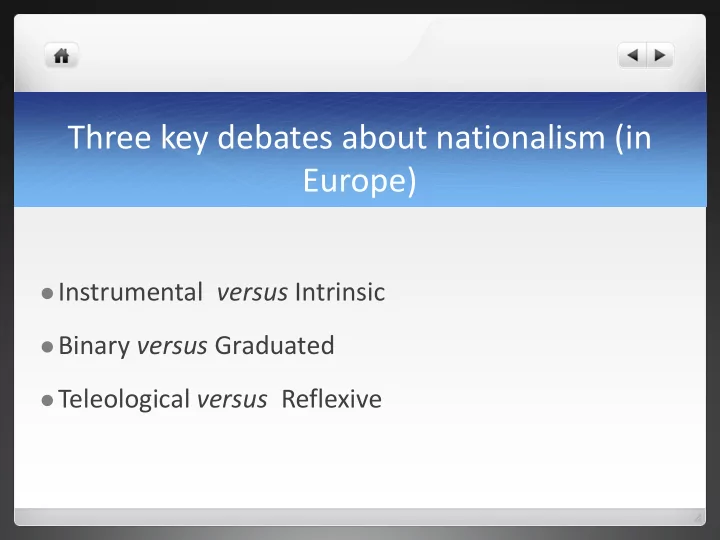

Three key debates about nationalism (in Europe) Instrumental versus Intrinsic Binary versus Graduated Teleological versus Reflexive
Instrumental versus Intrinsic (within liberal nationalism) National belonging and self-determination not just a causal precondition ( instrumental ) but a constitutive co-condition ( Intrinsic ) of a Life lived autonomously
Binary versus Graduated Self-determination , yes or no (tied up with attainment of sovereignty) OR Position on a spectrum (devolution, federalism, consociationalism, group rights, symbolic recognition, sovereignty-lite)
Teleological versus Reflexive Nationalism Teleological nationalism involves Specification of set and unchanging goal This ultimate goal typically an ambitious form of legal and political nationalism (Sovereignty or something similar) All lesser goals treated as means to end of ultimate goal rather than fundamental achievements Critical attitude towards failure to achieve or to pursue ultimate goal
Reflexive Nationalism Goals non-teleological - provisional rather than final, cumulative rather than predetermined Internal duality – subject (people) as well as object (institutional attainment), and iterative relationship between the two Plural Sensibility - aware of and prepared to factor in other and overlapping intersubjective constructions of national peoplehood Procedural emphasis - no duty to pursue or right to receive any particular outcome. Instead a standing entitlement to have aspirations taken seriously
Why reflexive nationalism in Europe? Strategic (widens support base) Reactive ( against statist denial) Post-Sovereign positioning (reflects more graduated picture of political authority in ‘3D’ European Union) Embedded in political landscape ( increasingly involved in government and long-term positioning. A more pragmatic attitude towards the uses of political power)
Feasibility and Transferability? Most state constitutions (and constitutional actors) remain silent or hostile as regards the prospect of sub-state nations deciding their own fate The EU’s attitude is one of ‘conservative neutrality’ Potentially with very different consequences across different European sub- state nations A transnational procedural constitutional right of non-state nations ‘to be taken seriously’ as regards secession and other outcomes still in very early stages of development
(Il)legitimacy On one view, illegitimate, because Redundant (esp. in Western Europe) Contradicts underlying ethos of EU (arguably a more cosmopolitan and ‘postnational’ approach to recognition of non-nationals)
Legitimacy (in favour) Why discriminate between old and new European nations in terms of ‘right to decide’? Rise of new illiberal nationalism in Europe of “old’ nations states’ reinforces claim of new sub-state liberal nationalism Primary Right theory in international law making some headway against ‘Remedial Right’ theory The EU, through ideas of subsidiarity and a broader sense of recognition of ‘national identity’, as well as through broader economic framework of regionalism, can instead be viewed as a champion of sub-state nationalism The EU has in any case, for now at least, redesigned the stage, and changed the stakes of political nationalism – sovereignty ‘prize’ retains symbolic value but less material value
Internal consistency and coherence of reflexive nationalism Sociological - the ‘new normal’ or a failure of momentum? Philosophical – Old ‘Sovereignty of Projection’ versus New ‘Sovereignty of Choice’? Does any group retain such an open-ended right, and, to the extent that they do, does this remain a right of national self-determination?
Recommend
More recommend